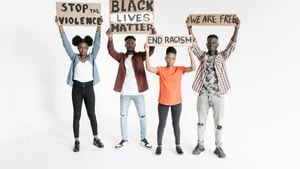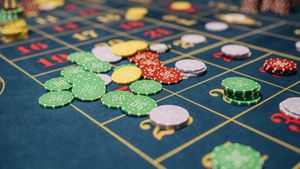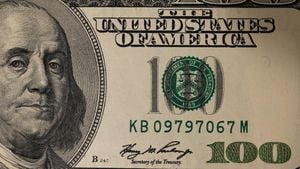Călin Georgescu, the unexpected face of Romania's latest presidential race, has surged from relative obscurity to lead the country’s first round of elections, igniting discussions on the future of the nation's political stance. A far-right candidate, Georgescu is known for his vocal skepticism of NATO and his admiration for Russia, which adds complexity to Romania's role within the western alliance.
Voters have been captivated by his persona, characterized by his presence on social media platforms, particularly TikTok, where he has carved out a niche connecting with younger constituents. His rise to prominence is particularly surprising, considering he had not been visible on major television debates nor had he aligned himself with any established political party. Yet, the 62-year-old is now gearing up for the runoff election scheduled for December 8, pitting him against Marcel Ciolacu, the leader of the Social Democratic Party, who supports Romania's commitment to NATO.
Georgescu's victory was recognized after he managed to secure the most votes, propelling him not just to mainstream visibility but also raising questions about the political direction Romania may take. This shift is especially significant as Romania finds itself bordering Ukraine, making it strategically important amid the current geopolitical climate dominated by the Russia-Ukraine war. His policies and rhetoric indicate he may steer Romania away from its traditional pro-Western orientation if he wins the presidency.
Analysts are warning of the potential ramifications of Georgescu's presidency on Romania's NATO membership and its impactful role within the European Union's stance against Russia. The candidate has previously expressed admiration for Romanian leaders from WWII who collaborated with fascist regimes, stirring controversies and raising concerns among those wary of his ideologies.
Should Georgescu take the presidency, he may have considerable influence over military and diplomatic relations with Ukraine, especially concerning Romania's support of military logistics and the export of Ukrainian grain through its key ports. The Port of Constanţa has become pivotal for the supply lines aiding Ukraine, and any radical changes to its policies could disrupt these efforts.
Călin Georgescu's political ideology reflects not just isolation from Western policies but broader themes of nationalism and skepticism toward international alliances, which threaten Romania’s established foreign relations. His questioning of NATO’s efficacy and his friendly stance toward Russia resonate with certain segments of the Romanian populace facing nationalistic sentiments amid economic challenges.
For some citizens, Georgescu embodies the voice of dissatisfaction currently brewing among voters who fear stagnation and loss of national identity. The competing narratives within this presidential race, encapsulated by Georgescu's outsider approach versus Ciolacu's establishment representation, evoke the broader debates prevalent across Europe during this politically tumultuous period.
The political climate is charged, urging citizens to reflect introspectively on their national values. The December 8 runoff will not only determine Romania's next leader but also set the course for how the country positions itself within the contentious web of East-West relations as Europe grapples with the enduring repercussions of the Ukraine conflict.
Voter engagement is expected to be high, with many seeking to make their voices heard on the prospective paths their country may undertake. There's significant interest surrounding how Georgescu can mobilize additional support and whether his far-right stances will attract moderates disillusioned with traditional politics.
Romania's history with far-right movements complicates this current narrative. Critics of Georgescu warn of the danger his election may pose, fearing it could amplify xenophobic rhetoric and exacerbate societal divisions.
With the election dates approaching rapidly, all eyes will be on Romania to observe whether Georgescu's ascension is indicative of broader populist trends within Europe or if it signals merely a localized phenomenon shaped by Romania's unique socio-political climate.
Many citizens remain cautious but intrigued, wondering how this election will frame their collective identity both at home and within the EU. Hence, as the country heads toward this decisive runoff, the stakes are undoubtedly high, leading to feverish anticipation and fierce political discourse around Romania's future direction.



